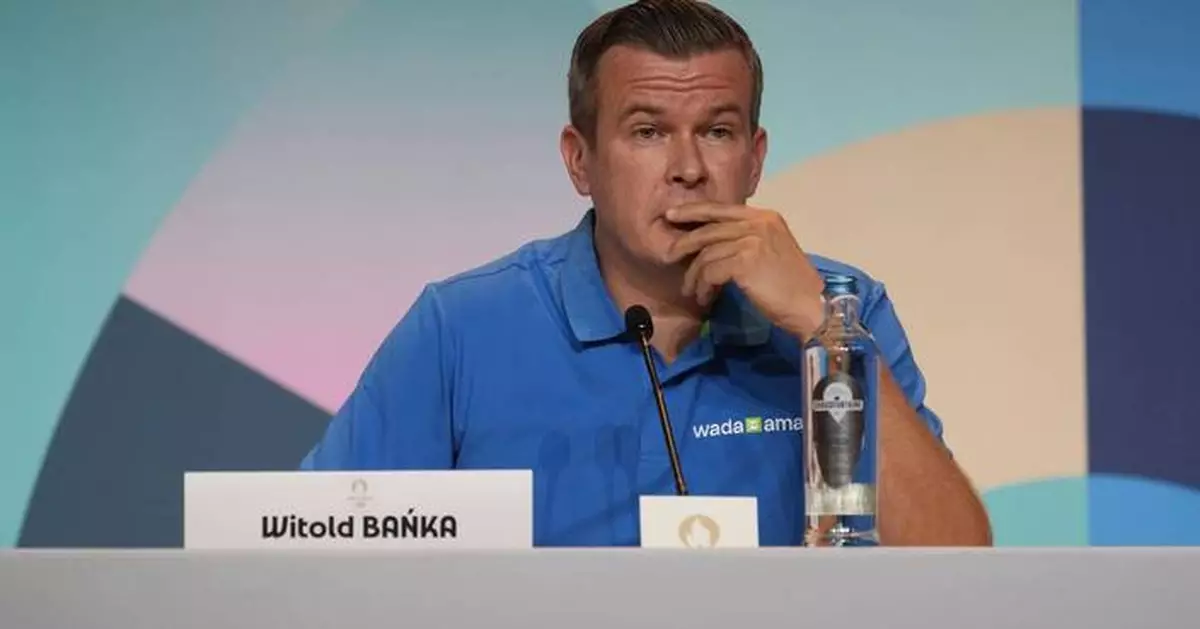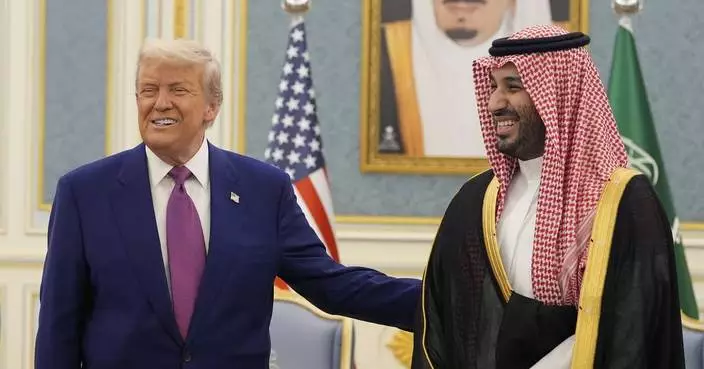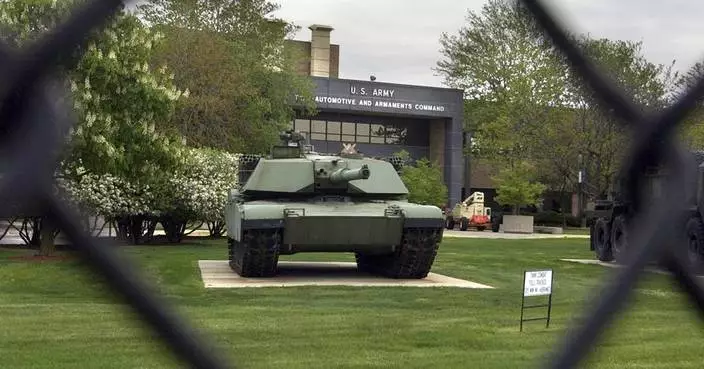The U.S. government did not pay the more than $3.6 million due to the World Anti-Doping Agency in 2024, making good on a long-running threat anchored in unhappiness with the global watchdog's handling of cases involving Chinese swimmers and others.
Those funds, normally distributed by the White House Office of National Drug Control Policy, represent about 6% of WADA's annual budget.
WADA statutes say representatives of countries that don't pay are not eligible to sit on the agency's top decision-making panels. U.S. drug czar Rahul Gupta is listed as a member of the WADA executive committee.
Gupta told The Associated Press the ONDCP was “evaluating all our options," and did not rule out eventually sending the money to WADA.
“WADA must take concrete actions to restore trust in the world antidoping system and provide athletes the full confidence they deserve,” he said. "When U.S. taxpayer dollars are allocated, we must ensure full accountability and it is our responsibility to ensure those funds are used appropriately.”
In 2022, when Gupta held out, then eventually directed his office to send the balance of its yearly contribution, he did so with reservations, along with a letter saying the U.S. absence at the time from key policymaking positions was “a sorry state of affairs.”
Half of WADA’s budget is covered by the International Olympic Committee, with the other half covered by governments across the world, which receive 50% of the spots on key WADA governing committees.
The U.S. contribution is double that of Canada, the home country for WADA that puts in the second most money among the more than 180 countries that contribute.
The funding fight has been going on for at least the last six years, with the talking points not much different between the Trump and Biden administrations.
Dissatisfied over the handling of the Russian doping scandal, the first Trump White House started asking for reforms with the potential of tying them to its annual payment. More recently, WADA's handling of cases involving 23 Chinese swimmers has been a focal point of criticism.
A government study that came out in 2020 concluded Americans didn't get their money's worth from the contribution. Shortly after, Congress gave the ONDCP discretion to withhold future funding.
In between, tensions have grown between WADA and the U.S. Anti-Doping Agency, which runs the drug-fighting program in the United States.
“Unfortunately, the current WADA leaders left the U.S. with no other option after failing to deliver on several very reasonable requests, such as an independent audit of WADA’s operations” in the wake of the Chinese doping saga, USADA CEO Travis Tygart said.
WADA, meanwhile, has chafed at the Rodchenkov Act, a law that allows the U.S. to prosecute people of any nationality involved in doping conspiracies. That bill was signed by Donald Trump at the end of his first term as president. The IOC suggested last year that investigations the law permitted could cost the U.S. a chance to host the Winter Olympics in Salt Lake City in 2034.
Just as some of that rhetoric died down comes the news that the U.S. is still deciding whether to pay its 2024 obligation.
And all of it comes against the backdrop of the United States preparing to play a large role in hosting international events. The World Cup arrives in the country next year, followed by the 2028 Olympics in Los Angeles.
“Now is the time to get WADA right to ensure these competitions on U.S. soil are clean, safe, and a pageantry of fair competition in which we can all have faith and confidence,” Tygart said.
He said WADA rules dictate that the money fight will not have any impact on U.S. athletes' ability to compete at home or abroad.
AP Summer Olympics: https://apnews.com/hub/2024-paris-olympic-games
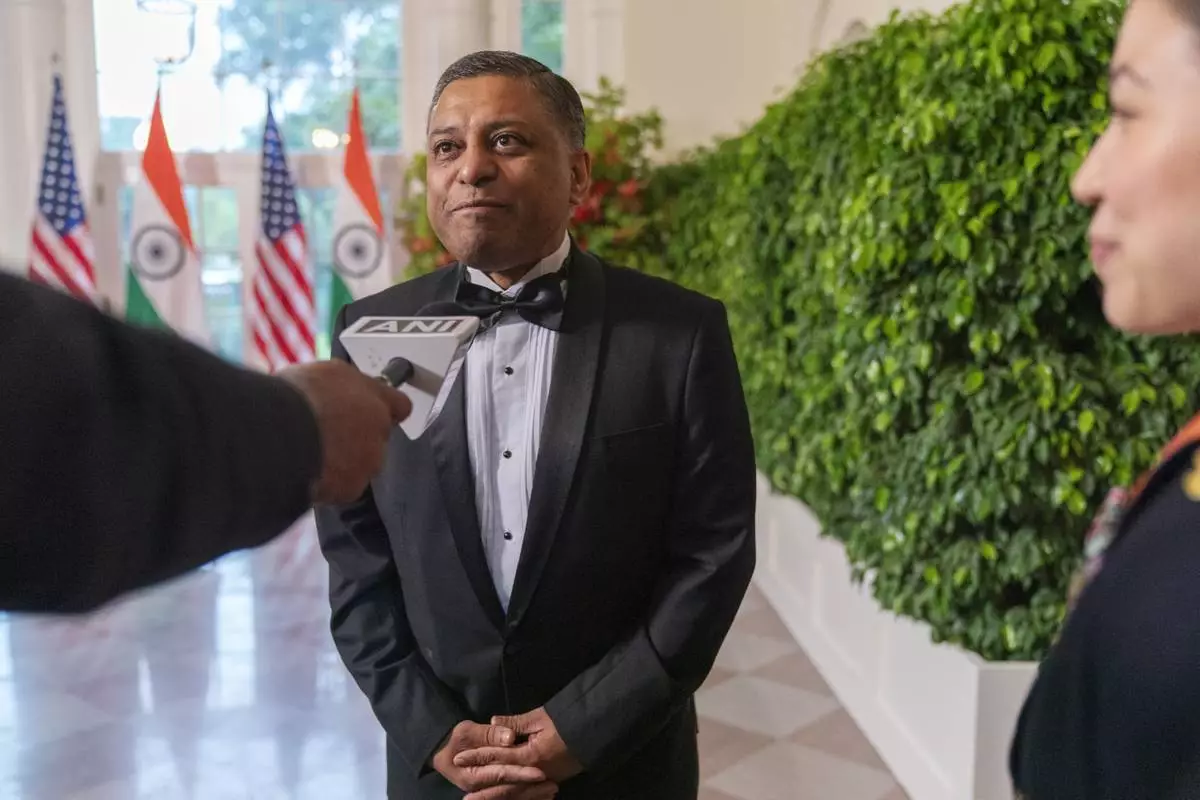
FILE - Dr. Rahul Gupta, the director of the White House Office of National Drug Control Policy, is asked a question as he arrives for the State Dinner with President Joe Biden and India's Prime Minister Narendra Modi at the White House, June 22, 2023, in Washington. (AP Photo/Jacquelyn Martin, File)
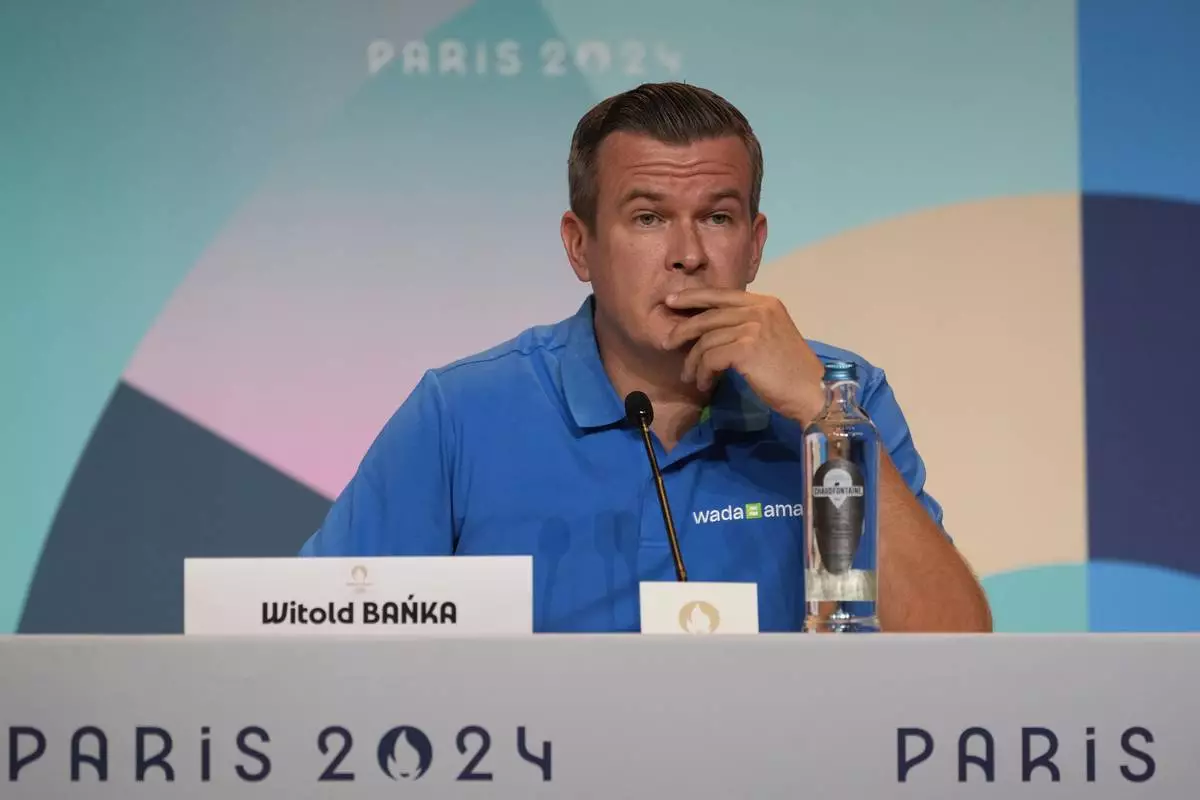
FILE - Witold Banka, president of the World Anti-Doping Agency (WADA), attends a press conference at the 2024 Summer Olympics in Paris, France, July 25, 2024. (AP Photo/Michel Euler, File)
A choppy day of trading on Wall Street ended with a mixed finish for stock indexes Wednesday, as gains by several big technology stocks helped temper losses.
The S&P 500 edged up 0.1% after wavering between small gains and losses much of the day. Most of the stocks in the index lost ground, but solid gains for several heavyweight technology companies like Nvidia helped counter a decline in health care and other sectors.
The Dow Jones Industrial Average slipped 0.2%, while the Nasdaq composite rose 0.7%.
Super Micro Computer surged 15.7% after signing a partnership agreement with Saudi Arabian data center company DataVolt. Advanced Micro Devices gained 4.7% after announcing a $6 billion stock buyback program.
Nvidia rose 4.2% and Google parent Alphabet added 3.7%.
Other big gainers included eToro Group, a retail trading platform for stocks and cryptocurrency. It rose 28.8% in its first day of trading.
The market has been relatively steady since its surge on Monday, which came after the U.S. and China entered a 90-day pause in their trade war. The market gained some more ground on Tuesday after the government reported that inflation unexpectedly cooled across the country in April. Additional updates on inflation and retail sales are expected on Thursday.
The benchmark S&P 500 index, which sits at the center many 401(k) accounts, has erased all its losses since President Donald Trump escalated his global trade war in early April. It has now also erased its losses for the year and is back to within 4.1% of its all-time high set in February.
“The stock market’s rally has legs, as the trade negotiation with China was seemingly the toughest one on the docket," said Rick Gardner, chief investment officer at RGA Investments.
Trump has delayed a large swath of his most severe tariffs against America's trading partners, but some import taxes remain in place. Uncertainty over the path ahead continues to hang over businesses and consumers. The on-again-off-again nature of Trump’s trade policy has left companies reluctant to make plans about investment and hiring and consumers nervous about spending.
Businesses continue to trim or withdraw their financial forecasts as they face unpredictable trade policy and cautious consumers.
American Eagle fell 6.4% after the retailer withdrew its financial outlook for the year citing “macro uncertainty.” General Motors, UPS, Kraft Heinz and JetBlue are among the many companies representing a wide range of industries that have warned about the impact of tariffs and a weakening economy.
More than 90% of companies in the S&P 500 have reported earnings for their latest quarter. The majority of companies have reported better-than-expected earnings, but forecasts for earnings growth during the current quarter have been broadly cut in half for companies in the index.
The economy has already showed signs of slowing. It shrank 0.3% during the first quarter amid a surge of imports as businesses and consumers tried to stock up amid tariffs and policy uncertainty.
Inflation remains a big concern. The latest data on consumer prices released Tuesday showed that tariffs haven’t had much impact yet. But that could change as the impact of current tariffs make their way through supply chains and delayed tariffs potentially go into effect. Inflation has cooled to just above the Federal Reserve's target of 2%, but the threat of higher prices on goods because of import taxes has heightened worries about inflation heating up.
The U.S. on Thursday will release its April report for inflation at the wholesale level, which is what companies are paying for goods. Economists expect an easing of inflation there.
The latest update Thursday for retail sales is expected to reflect a sharp drop to 0.2% in April from 1.4% the previous month.
Retail giant Walmart will also report its latest financial results on Thursday and its financial forecasts will be closely watched.
In the bond market, Treasury yields edged higher. The yield on the 10-year Treasury rose to 4.54% from 4.47% late Tuesday. The two-year Treasury yield, which moves more closely with expectations for Fed action, rose to 4.06% from 4.00% late Tuesday.
All told, the S&P 500 rose 6.03 points to 5,892.58. The Dow fell 89.37 points to 42,051.06, and the Nasdaq gained 136.72 points to 19,146.81.
In stock markets abroad, indexes rose in Asia and were mixed in Europe.
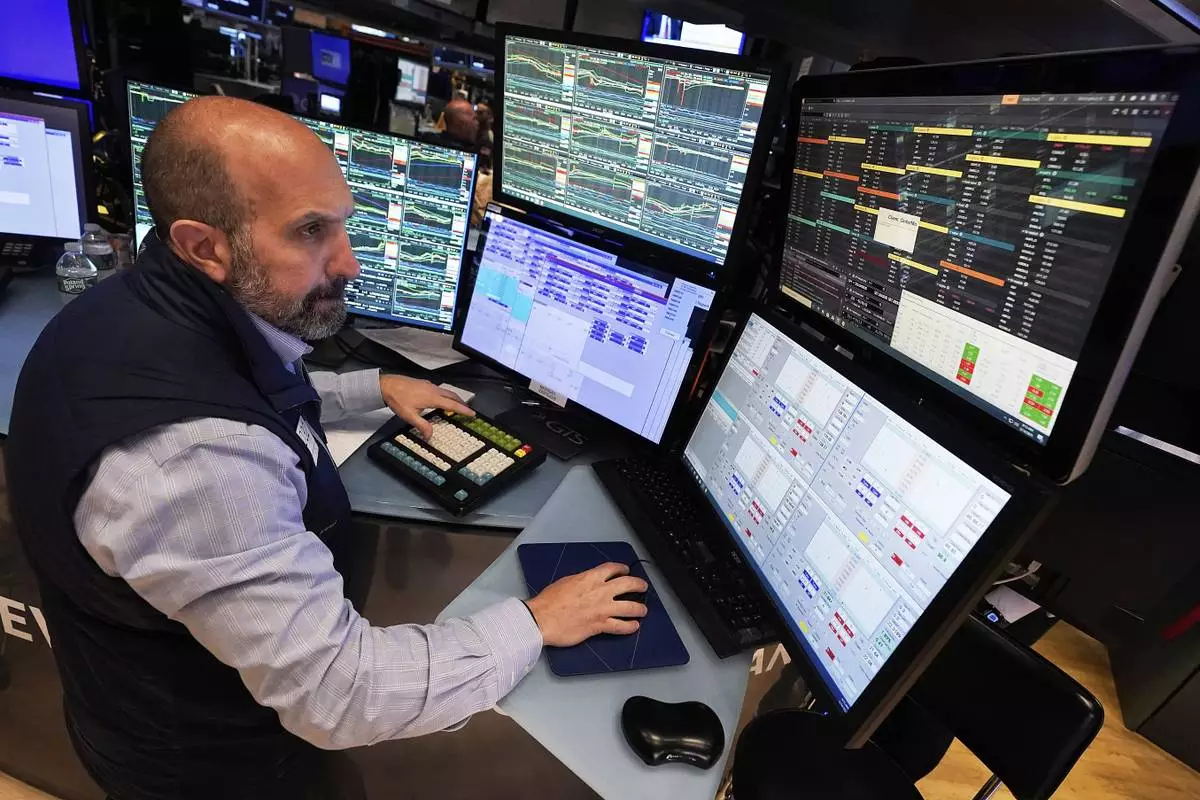
Specialist James Denaro works at his post on the floor of the New York Stock Exchange, Wednesday, May 14, 2025. (AP Photo/Richard Drew)
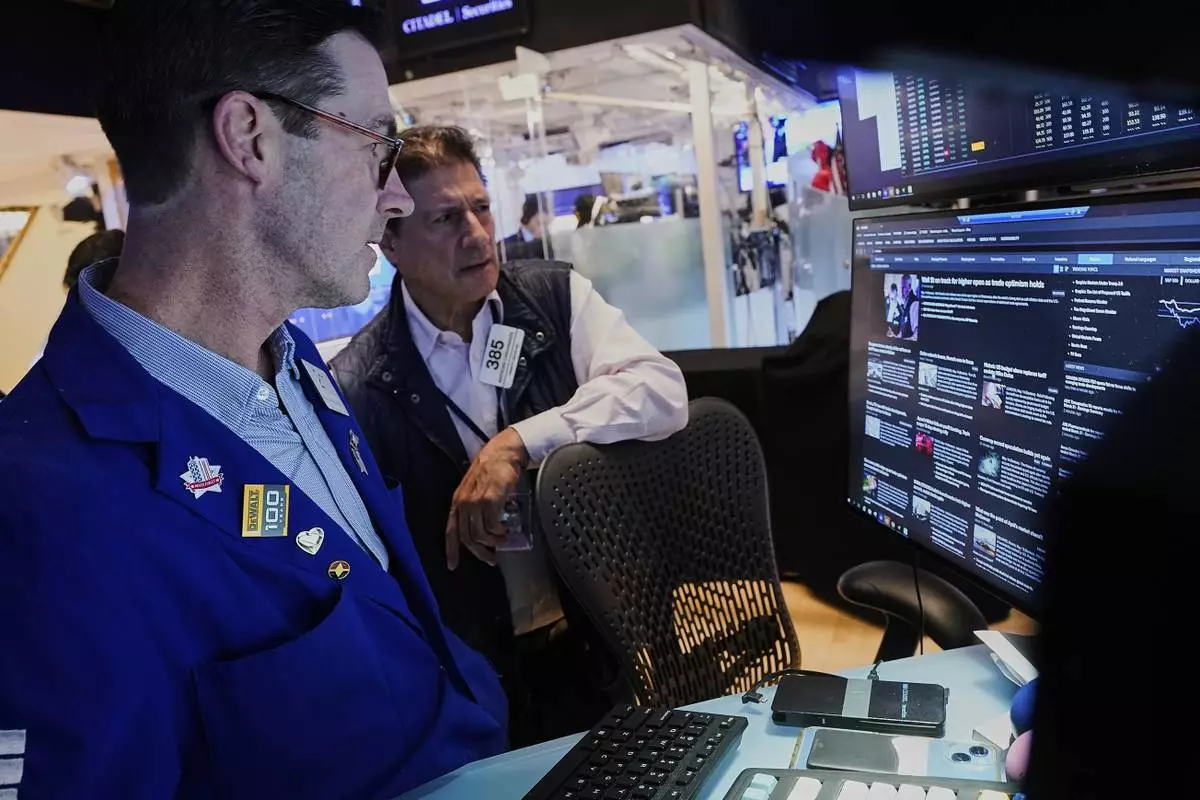
Specialist John McNierney, left, and trader Anthony Carannante work on the floor of the New York Stock Exchange, Wednesday, May 14, 2025. (AP Photo/Richard Drew)
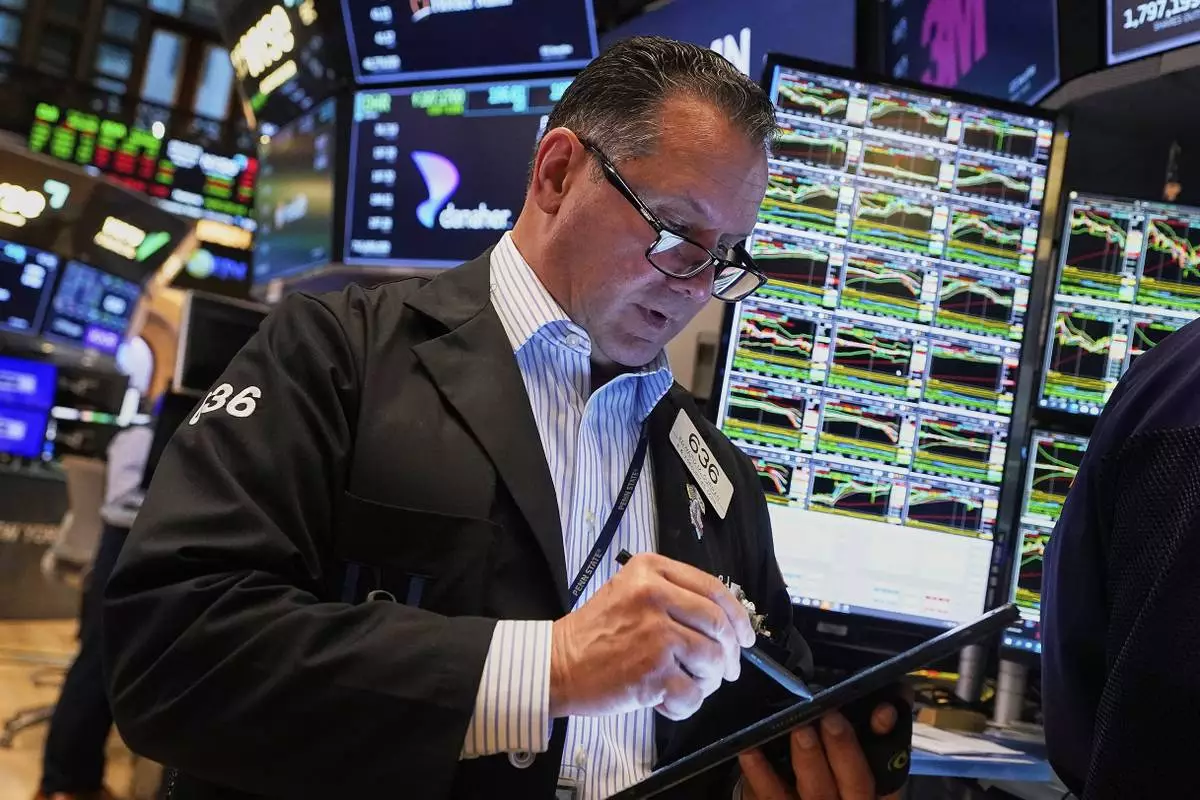
Trader Edward Curran works on the floor of the New York Stock Exchange, Wednesday, May 14, 2025. (AP Photo/Richard Drew)
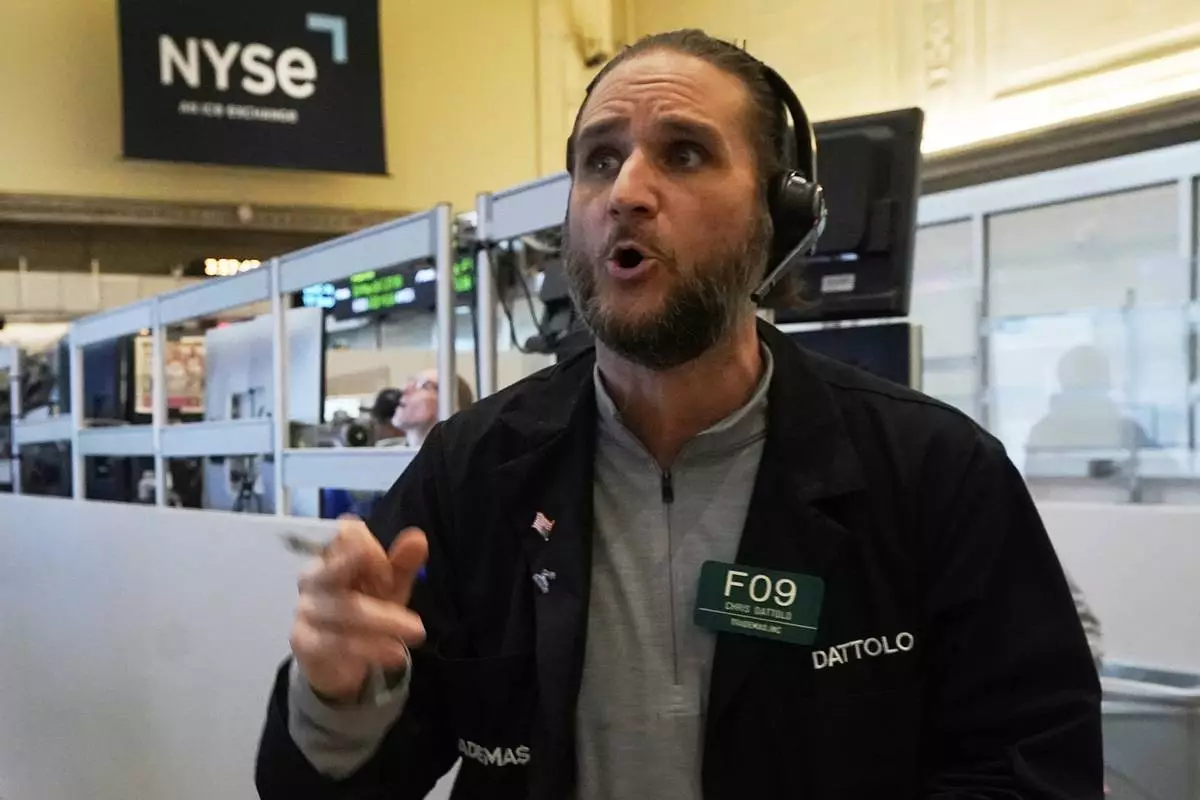
Options trader Chris Dattollo works on the floor of the New York Stock Exchange, Monday, May 12, 2025. (AP Photo/Richard Drew)
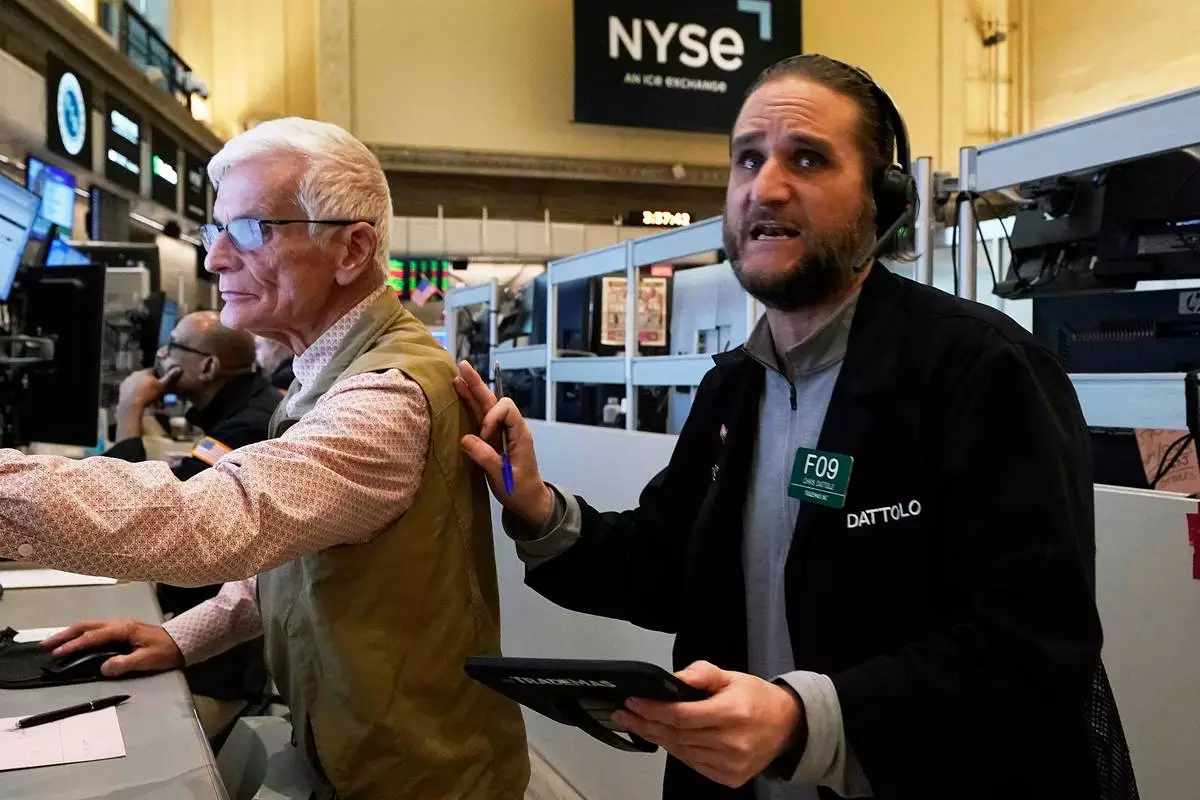
Options trader Chris Dattollo, right, works on the floor of the New York Stock Exchange, Monday, May 12, 2025. (AP Photo/Richard Drew)
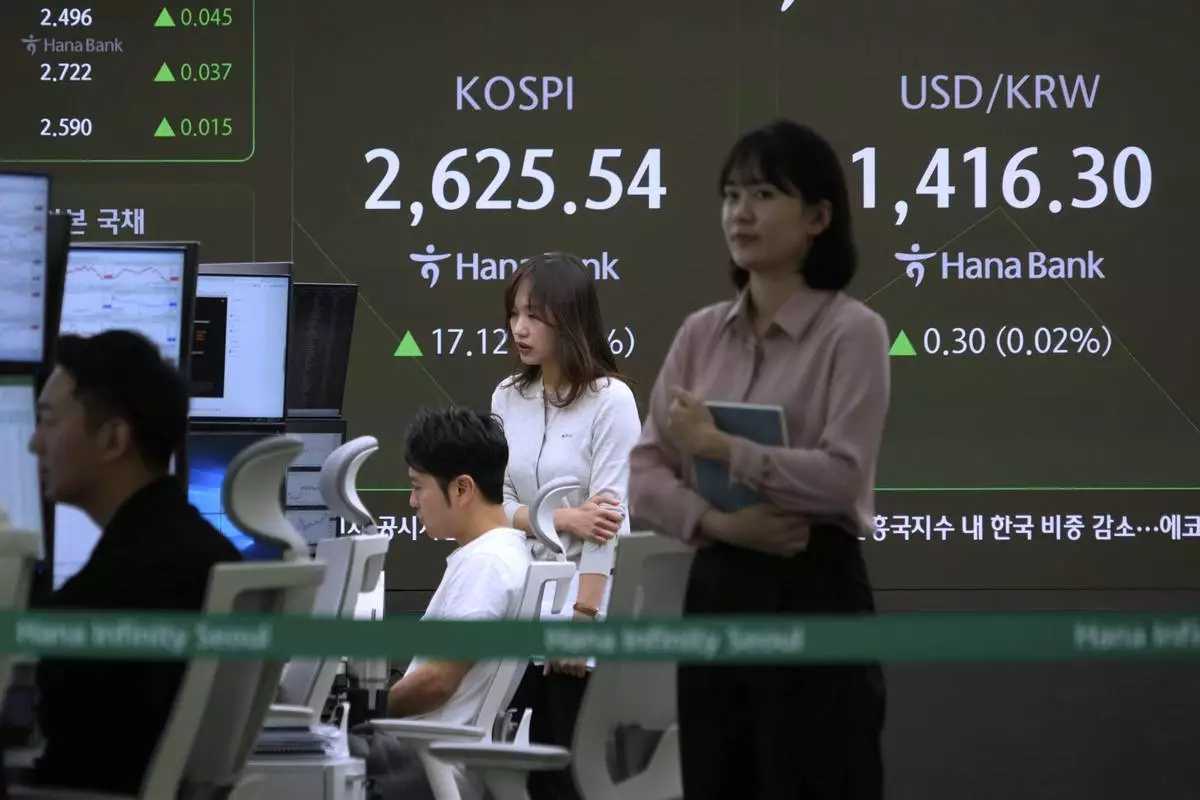
Currency traders work near a screen showing the Korea Composite Stock Price Index (KOSPI) and the foreign exchange rate between U.S. dollar and South Korean won, right, at the foreign exchange dealing room of the KEB Hana Bank headquarters in Seoul, South Korea, Wednesday, May 14, 2025. (AP Photo/Ahn Young-joon)
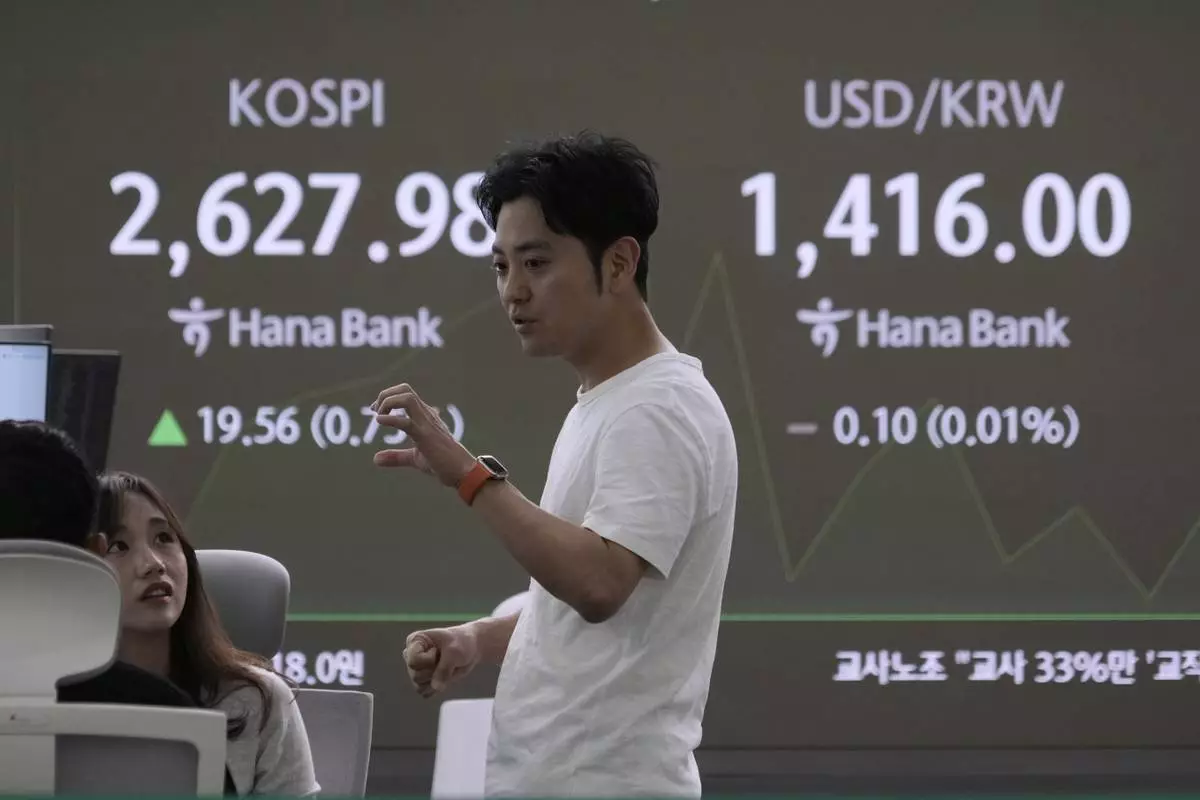
Currency traders work near a screen showing the Korea Composite Stock Price Index (KOSPI), left, and the foreign exchange rate between U.S. dollar and South Korean won at the foreign exchange dealing room of the KEB Hana Bank headquarters in Seoul, South Korea, Wednesday, May 14, 2025. (AP Photo/Ahn Young-joon)
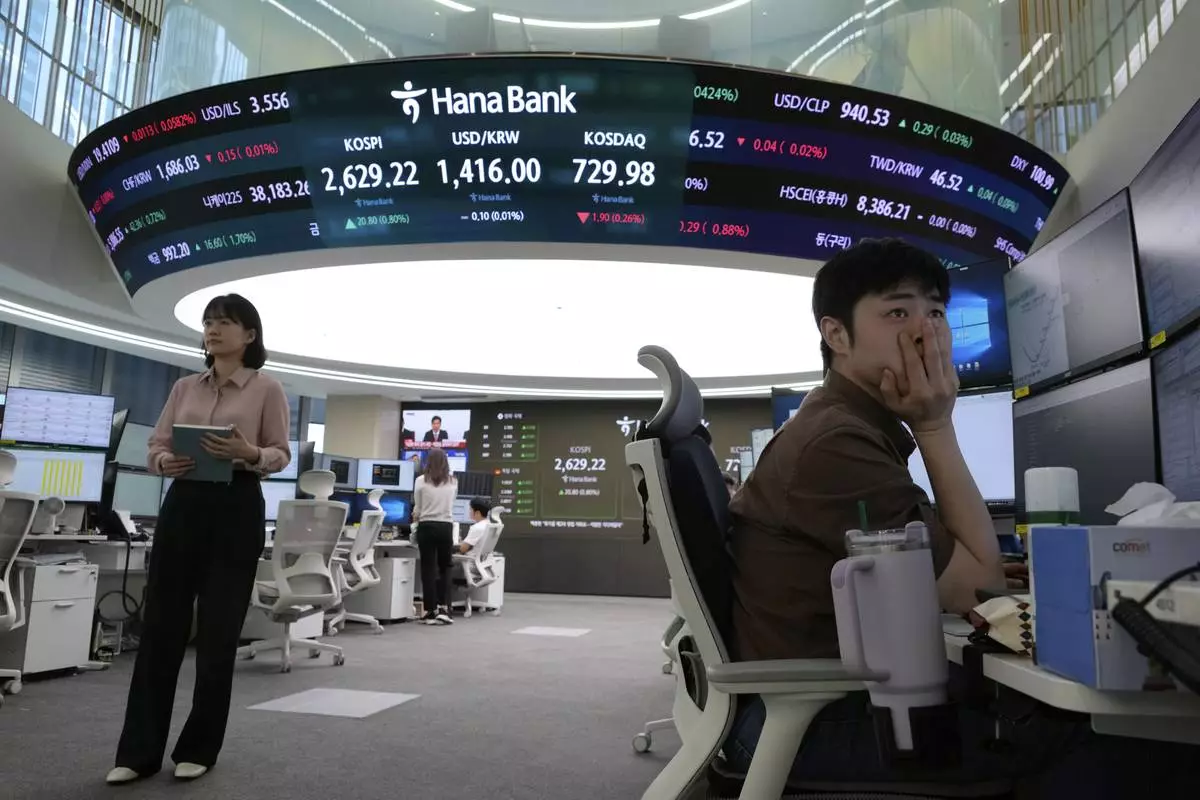
A currency trader watches monitors near a screen showing the Korea Composite Stock Price Index (KOSPI), top center left, and the foreign exchange rate between U.S. dollar and South Korean won, top center, at the foreign exchange dealing room of the KEB Hana Bank headquarters in Seoul, South Korea, Wednesday, May 14, 2025. (AP Photo/Ahn Young-joon)




